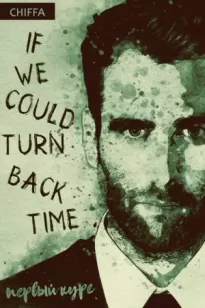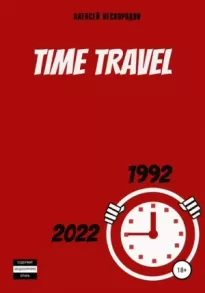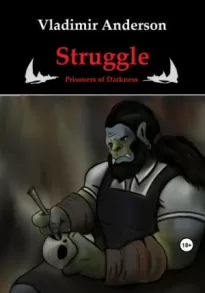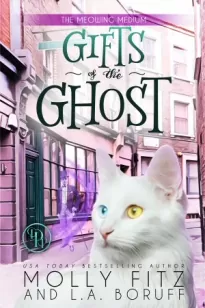TWICE IN TIME
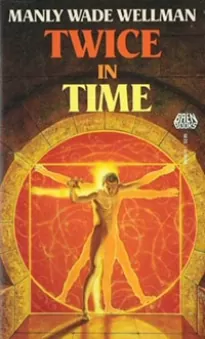
- Автор: Мэнли Веллман
- Жанр: Фантастика
Читать книгу "TWICE IN TIME"
CHAPTER XIII The Fate of Volterra
Here was, indeed, what seemed a full stop to our hopes for completing the mechanism. I could think of nowhere to get alum in a large enough portion but in a mine. True, crystals may be built or fed, but I did not know how; and the only available mine was the one at Volterra.
That defiant city was a small one, but plucky and proud, with splendid defenses. As I mused, into my mind drifted a few lines of a poem I had heard very often in my other existence:
… lordly Volterra
Where stands the far-famed hold,
Piled high by hands of giants
For god-like kings of old.[10]
Whether Volterra's defenses were giant-built and god-begun I cannot say; but they were tremendously old and strong, what I was to see of them, walls of rough-cut stone that were said to go back to ancient Etruscan times. The city thus enclosed stood upon a huge olive-clad height, from which the sea was visible, a score of miles distant. Near at hand opened the dark mouths of the alum mines which were so suddenly forbidden to us. In fact, the Volterrans forcibly ejected certain Florentine commissioners who claimed a tribute for Lorenzo.
His Magnificence undoubtedly meant what he had once told me about wishing to avoid war as costly, dangerous, and ignoble. But this was too loud a challenge for even his considerable patience. In the spring of 1472 he called a meeting of the Signoria—the lot-chosen body of citizens who acted as public council—for discussion of the problem. It so happened that Guaracco himself, a Florentine resident by virtue of that house near Verrocchio's
I, too, would have liked to attend, but it was impossible. Lorenzo had called for a secret session—proof of his concern over the matter. All I knew was that one of the Signoria, a conservative old fellow by the name of Tomasco Soderino, was intending to speak strongly for conciliation and peace. Perhaps he could restore friendship with the Volterrans, make it possible for me to secure my alum.
I wished Lisa were there, to talk serenely and pleasantly to me. But with Guaracco's permission she was visiting a friend, the abbess of a convent near Venice.
The meeting lasted all morning, and all afternoon, and at the end of it Guaracco came to seek me at Verrocchio's.
"It is all settled," he informed me, grinning triumphantly.
"Settled?" I repeated. "Peace, you mean?"
"War," he replied. "We take your needful alum by force."
I felt a little shocked. "But Soderino was going to—"
"Aye, and he did," Guaracco anticipated the end of the sentence. "Bleated about soft answers to turn away Volterran wrath, bleated for hours. I had an answer ready. I told Lorenzo that we could not make your flying machine without alum, and plenty of it."
"Alum is not for the flying machine," I protested, "but for the time reflector."
He gestured idly with a big hand. "Do you not think I know, boy? But we need alum, and what matter under which pretext we get it? Lorenzo is obsessed with desire to see men fly. My word was the final ounce in the balance to make him decide for war."
After that, things moved fast in Florence, because word arrived that the town of Volterra had employed a round thousand tough mercenaries to defend her ancient walls. Lorenzo immediately gathered four times that number of troops, and as their commander engaged Federigo d'Urbino, one of the most noteworthy soldiers of the Italian peninsula.[11]
He did not deign to take command himself, and restrained the younger and more fiery Giuliano from volunteering to lead the mounted lancers. But the brothers did lead the force in procession through the chief streets of the city.
To me that glittering spectacle was somehow ironic. The cavalry was, for the most part, French and Navarrese, the pike-trailing infantry largely Swiss and Swabian, the crossbow companies from Sicily, the artillery and seige train Spanish, and the whole cosmopolitan host sprinkled here and there with Scots, Hungarians, Englishmen, and Moors.
If any element was really missing, it was Florentine.
Yet that was the way the city-states of Italy fought—not with their own blood, but with professional adventurers. Perhaps something can be said for the system. Battles lacked the extreme ferocity of deadly enmity, for opposing generals were often old friends and comrades in arms, who were willing to win or lose, so to speak, on points. At any rate, the Florentine shopkeepers and artisans seemed pleased, and cheered those foreign soldiers as loudly as though a force of native Tuscans was marching away to war.
Guaracco, as leader of the party that advocated strife, went to the palace for permission to accompany the mercenaries. I was with him as he found Lorenzo, writing busily at his desk in the audience chamber.
"Go if you will," the ruler told Guaracco, without raising his eyes from the page. "I trust that this campaign is final."
"You mean, destruction of Volterra?" prompted Guaracco, like a lawyer wrenching an admission from a witness.
Lorenzo seemed to hear him only by half. "That physician is often most cruel," he murmured, as he resumed writing what looked to be a verse, perhaps a sonnet, "who appears most compassionate.'
To this moment I am sure that what he said was being fitted into his poem, and had nothing to do with the campaign. Even if I am wrong, it was a most equivocal answer. But Guaracco bowed as though he had received specific and welcome orders. Then he hurried away.
Perhaps I should have gone with him then, but I had no stomach for battle. I felt some uneasy guilt because with Federigo d'Urbino's train of seige ordnance went my multiple-cannon arrangement for battering down walls, and many of the crossbowmen carried weapons with Guaracco's lever improvement which I had clarified in a sketch.
A day I lingered in the town, which buzzed with excitement about the campaign. A whole night I lay wakeful in the cell-like room I still kept at Verrocchio's
It was as if a voice called me to Volterra.
Yet, for all my strangely risen anxiety, I could not ride my poor horse to death. I did no more than thirty-five miles the first day, stopping the night at a peasant's hut. When in the morning I continued, before I had ridden an hour I met another horseman, galloping in the direction of Florence. He was a half-armored French lancer, with the velvet-edged sleeves of an under officer. Also, he was three-quarters drunk, and waved a grubby wine bottle at me.
"Way! Way!" he bawled. "I bear messages to Lorenzo!"
But I spurred forward and managed to seize his bridle.
"Tell me," I said earnestly, "how goes the fighting at Volterra?"
He started to laugh, and finished by hiccoughing. "Fighting?" he echoed scornfully. "Now nay, there was no fighting."
"How's that?" I persisted.
"We marched under the walls of the town, and bade them surrender. And"—he broke off to swig wine—"and they did!" More gulping laughter over something he deemed a joke. "Now, let me ride on with my dispatches, young sir."
"One word more," I begged, but he struck at me with the bottle.
It was of stone, and heavy, but I flung up my forearm to save my head and sustained only a musty drenching. With a prick of the spur, I forced my gray horse close against his mount, shifting my hand from his bridle to his collar, and with the other hand I wrenched the bottle away from him.
"Why is the army not returning?" I demanded, and shook him hard.
He lost his fierceness, but not his joy over what had happened.
"You cannot guess?" he flung back, with a soldier's contempt for one who does not understand military routine. "The lads are plundering. What else? So should I be plundering, if—"
I pushed the wine bottle back into his fist, and let him go. With whip and spur I sped on my way.
But when I arrived I was too late, even if I had had the power and knowledge to divert that misdeed.
Volterra gushed flame from within her walls. Around the town capered the victorious troops, some of them drunker than the courier I had met, others staggering under burdens of loot. Even from afar I heard yells and laughter. The camp, a great field of tents beneath the hill that supported the town, was almost deserted, and into it I spurred. By chance I came almost at once to the commander's pavilion and there I found Federigo d'Urbino, sitting alone.
He slouched forward on his folding chair, his long, black-tufted chin clutched in a hard hand. His face was as somber as his armor was bright. He glared up as I swung out of the saddle.
"You come with dispatches from Florence, I make no doubt," he growled. "Ride back and tell that blood-drinker, Lorenzo, that I will never draw sword for him again, not if he seek to buy me with all the treasure of Croesus."
"What is this drivel?" I snapped back. "Is not this atrocity your bidding?" In my revulsion, I forgot that I was calling to account the foremost soldier of the peninsula. But he only shook his head.
"Not my bidding. Lorenzo's. I—I have a reputation as a gentleman and a merciful Christian."
"To be sure it was Lorenzo's bidding," said a voice behind me, a voice that often had a way of breaking in on conversations. "You, my dear young Cousin, heard Lorenzo speak to me, give me a message."
I whirled upon Guaracco, thrusting my angry face into his.
"You dared order this pillage and destruction, as though you were Lorenzo's agent?"
"Aye, that," he admitted with the utmost good cheer. "You can bear me witness before Ser Federigo. His Magnificence was plain: 'That physician is often most cruel—' "
"So you interpreted his thoughtless speech, you murdering dog!" I almost choked, and out of my scabbard I swept my blade. "Draw, before I cut you down and rid Earth of your eternal deviltry!"
The red beard rustled in his old smile of mockery. "I have no sword, Leo," he said, as though in chiding reminder. "I bear only—this."
From under the fringe of his mantle his hand stole into view, with his self-invented pistol ready cocked. Even at that, I might have fallen upon him and forced him to shoot, perhaps killing me, but Federigo d'Urbino, who did not recognize that deadly little weapon for what it was, sprang up and caught my arm.
"Do not add one more murder to this massacre, young sir," he begged me. "It is possible that Ser Guaracco truly misunderstood. Yet—" he turned away. "Somehow I must stop these fiends at their hell's work."
Left alone with me, Guaracco stepped warily out of my reach, pistol still leveled. "It is true that I urged Lorenzo's words upon the army, and it was none too loth to sack the town. I have even taken a piece of loot myself. Come and see."
At some time during that speech he had brought his other hand into view. Something gleamed softly and slyly between thumb and finger—his great lustrous pearl, full of spells.
I fought against its power, as against a crushing weight, and indeed I did not lose my wits. But I grew tremulous and vague of thought, and let him coax me to sheathe my sword.
"Come and see," he repeated, and I went with him, slowly and a little drunkenly, to a tent not far from the commander's.
And there he showed me what he had seized from some Volterran shop or warehouse. A great soapy block of alum, reflecting subdued gray and blue lights, lay upon a length of canvas. It was almost exactly cubical, and a good yard along the edge.
"I knew that I must get hold of this piece," Guaracco told me, "and so I passed on Lorenzo's orders. You must not blame me, Leo, if I show scientific zeal."
Some worse motive had really caused him to start the cruelties, but I gazed at the greasy-looking crystal, and its light seemed to drive out some of his spell. In it I saw even a gleam of hope. It would help me to a completion of the time reflector. Then I would be quit of the Renaissance, its frustrations and fantasies. Above all, I would be quit of the abominable Guaracco.

